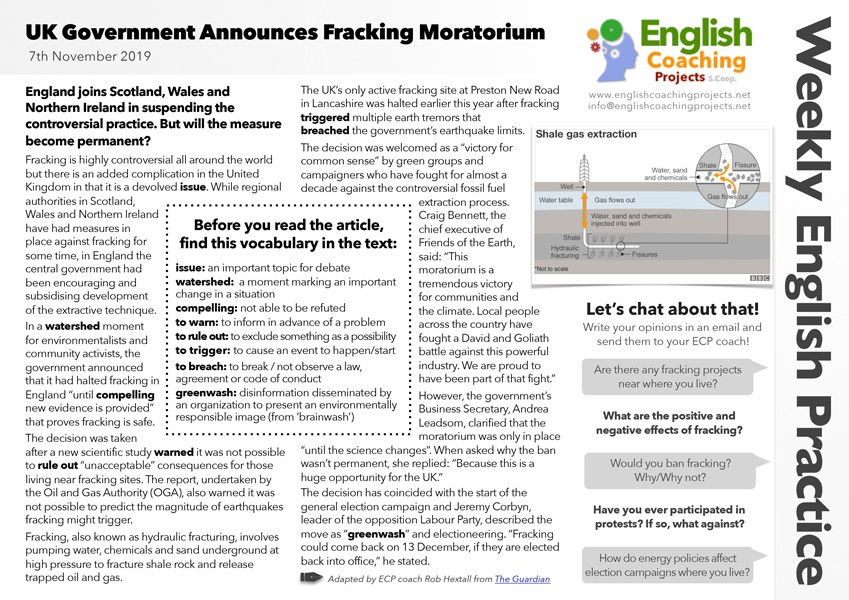England joins Scotland, Wales and Northern Ireland in suspending fracking. But will the measure become permanent?
Click on the image to download the pdf
England joins Scotland, Wales and Northern Ireland in suspending the controversial practice. But will the measure become permanent?
Read and check you understand this vocabulary before you read and listen to the text:
issue: an important topic for debate
watershed: a moment marking an important change in a situation
compelling: not able to be refuted
to warn: to inform in advance of a problem
to rule out: to exclude something as a possibility
to trigger: to cause an event to happen/start
to breach: to break / not observe a law, agreement or code of conduct
greenwash: disinformation disseminated by an organization to present an environmentally responsible image (from ‘brainwash’)
Listen to the audio (refresh the page if it’s not visible)
Fracking is highly controversial all around the world but there is an added complication in the United Kingdom in that it is a devolved issue. While regional authorities in Scotland, Wales and Northern Ireland have had measures in place against fracking for some time, in England the central government had been encouraging and subsidising development of the extractive technique.
In a watershed moment for environmentalists and community activists, the government announced that it had halted fracking in England “until compelling new evidence is provided” that proves fracking is safe.
The decision was taken after a new scientific study warned it was not possible to rule out “unacceptable” consequences for those living near fracking sites. The report, undertaken by the Oil and Gas Authority (OGA), also warned it was not possible to predict the magnitude of earthquakes fracking might trigger.
Fracking, also known as hydraulic fracturing, involves pumping water, chemicals and sand underground at high pressure to fracture shale rock and release trapped oil and gas.
The UK’s only active fracking site at Preston New Road in Lancashire was halted earlier this year after fracking triggered multiple earth tremors that breached the government’s earthquake limits.
The decision was welcomed as a “victory for common sense” by green groups and campaigners who have fought for almost a decade against the controversial fossil fuel extraction process. Craig Bennett, the chief executive of Friends of the Earth, said: “This moratorium is a tremendous victory for communities and the climate. Local people across the country have fought a David and Goliath battle against this powerful industry. We are proud to have been part of that fight.”
However, the government’s Business Secretary, Andrea Leadsom, clarified that the moratorium was only in place “until the science changes”. When asked why the ban wasn’t permanent, she replied: “Because this is a huge opportunity for the UK.”
The decision has coincided with the start of the general election campaign and Jeremy Corbyn, leader of the opposition Labour Party, described the move as “greenwash” and electioneering. “Fracking could come back on 13 December, if they are elected back into office,” he stated.
Adapted by ECP coach Rob Hextall from The Guardian
Let’s chat about that!
Write your opinions in an email and send them to your ECP coach!
Are there any fracking projects near where you live?
What are the positive and negative effects of fracking?
Would you ban fracking? Why/Why not?
Have you ever participated in protests? If so, what against?
How do energy policies affect election campaigns where you live?


